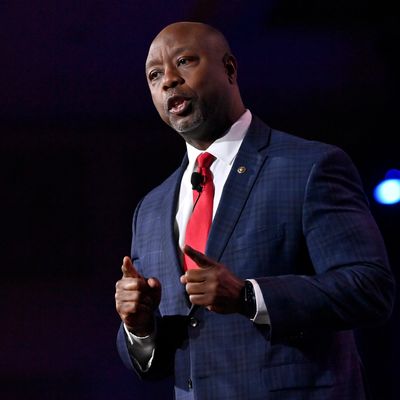
As the Republican 2024 presidential field belatedly begins to take shape, it looks like not one but two South Carolinians will take the plunge against co-front-runners Donald Trump and Ron DeSantis (assuming he runs). Last week, word got out that former Palmetto State governor Nikki Haley is planning an imminent campaign announcement. Now there are credible reports (reinforced by months of engine-revving travel) that Tim Scott, the man Haley appointed to the U.S. Senate in 2012, is going to go for the gold as well. The Wall Street Journal reports Scott’s plans are pretty far advanced:
Mr. Scott, the only Black Republican in the Senate, is testing a message with GOP voters in key early states focused on unity and optimism as some Republicans say it is time to move on from the Trump era. Mr. Trump has announced a bid for president in the 2024 election.
Jennifer DeCasper, a Scott senior adviser, said he was “excited to share his vision of hope and opportunity and hear the American people’s response.”
Scott’s national profile has been high and positive among Republicans ever since his well-received official party response to Joe Biden’s first speech to a joint session of Congress in 2021, in which the only Black Republican senator memorably proclaimed “America is not a racist country” and attacked race-conscious remedies for discrimination. It’s hard to overemphasize how much white Republicans love to hear their innocence from racism proclaimed by non-white voices. Scott has obliged at times, but he is an accomplished politician representing an authentic Black conservative tradition rooted in churches and small businesses.
Is that enough to make Scott a viable presidential candidate? That’s unclear, but it probably does guarantee he won’t simply be ignored like some other 2024 long shots. Herman Cain and Ben Carson created brief but intense sensations as Republican presidential candidates in 2012 and 2016, respectively, largely because they were accomplished political outsiders who broke the GOP candidate mold and were particularly good at mocking “political correctness.” But as political novices, they unsurprisingly ran poorly organized and financed campaigns whose shortcomings caught up with them (Cain also had to deal with sexual harassment allegations). Scott, a strong fundraiser who has placed his new super-PAC in good hands, isn’t likely to implode. But in a field of candidates implicitly and explicitly promising to usher in a glorious post-Trump future for the GOP, Scott will need an ideological identity that goes beyond legitimizing his party’s “color-blind” racial policies. He won respect in Washington for his deftness in negotiating and ultimately killing a bipartisan police-reform bill just in time for his party to go on an old-school law-and-order bender in the 2020 and 2022 election cycles. But that sort of chore is more likely to make him a future Cabinet member, like Carson, than a president of the United States.
The two distinctive policy ideas that Scott is most associated with are hardy perennial conservative prescriptions for (allegedly) helping poor and minority Americans: tax preferences for private capital investments in low-income areas and “school choice.” These proposals work in conservative politics because whatever else they signify, “enterprise zones” mean tax cuts and school vouchers mean public subsidies for private (and often religious) schools at the expense of “government schools.” Scott’s going to need something a little more novel than promoting these chestnuts that virtually all Republicans support anyway.
One of Scott’s best assets in what could be a vicious primary season dominated by Trump and DeSantis is his sunny disposition.
“He truly believes that God is great and America is great and we are provided with incredible opportunities. So I think a Ronald Reagan ‘Morning in America’ hopeful America vision is one that Tim has, lives and breathes and is really needed in our country,” Republican senator John Barrasso told the Journal.
It’s possible Republicans could grow sick of nuclear exchanges that drive up the negatives of the big-time candidates and hurt the party as well. Scott could catch on as the beneficiary of a murder-suicide scenario involving the equally saturnine Floridians Trump and DeSantis.
But for Scott as well as for his frenemy Nikki Haley, the immediate problem will be the unfair but inevitable perception that they are really running for vice-president. So long as Scott and Haley aren’t polling terribly well, and particularly if they don’t attack their potential benefactors, that perception will be hard to shake. They may both need to rule out a veep nomination in order to be taken seriously as aspirants for the big job.
The even more glaring problem the two South Carolinians share is being from the same early-primary state — one where Trump has already won endorsements from the current governor, lieutenant governor, senior U.S. senator, and three U.S. House members. For Scott in particular, I don’t know what’s more uncomfortable: not having the support of his Senate colleague Lindsey Graham, or running against his benefactor Haley. And while neither Scott nor Haley will get all that much credit from the political world for winning their own state, losing there would be death for either candidacy.
It’s true that both Scott (who is 57) and Haley (who is 51) are relatively young by contemporary presidential standards. Maybe one or the other is really engaging in a sort of starter presidential campaign in order to build contacts and positive name ID for a future run. In that case, a respectable start, a signature moment or two, and a graceful exit from the 2024 contest may be the real goal.
More on politics
- Everyone Biden Has Granted Presidential Pardons and Commutations
- Trump Is Threatening to Invade Panama, Take Back Canal
- What Happened to Texas Congresswoman Kay Granger?






























